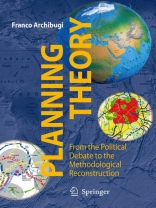Planning Theory expresses a sound unease about the direction taken by the current analysis and criticism of planning experiences, both in the field of economics and in urban and regional planning.
Instead of seriously revising the technical and scientific shortcomings marking the various problems encountered in the planning experience in both fields, academic debates and reflection have instead led to a kind of political interpretation. On the basis of the hopelessness of improving the governance of managerial and political planning initiatives, planning theory has been reduced to a generic sociological debate on planning itself; a debate that freezes planning as a permanently declining engagement.
To oppose this, the present book aims to identify the essential guidelines of a re-launch of planning processes and techniques, configuring a kind of neo-discipline, called ‘planology’ by the author, which builds upon a multi-disciplinary integration (never seen and experimented with until now) of economic, environmental, and sociological approaches, a crucial element missing in previous unsuccessful planning attempts.
Tabella dei contenuti
Planning Theory: Reconstruction or Requiem?.- In Search of Integration:The Past Negative Experience.- Towards a New Unified Discipline of Planning.- The First Routes of the New Discipline.- Some Integrative Topics of the New Planning Discipline.- Planning Science: Basic Postulates and Logical Framework for Reference.- The Future of National Planning Systems: Some New Steps.- Planning and Plan Evaluation: Some Well-Known and Often Neglected Pitfalls.- Conclusions.
Circa l’autore
Professor of Planning (in several Italian Universities, and lastly at the Postgraduate School of Public Administration, Rome; President of the Planning Studies Centre, Rome).
He has been consultant of many international institutions (UNDP, UNESCO, UN-ECE, UNEP, OECD, European Union, Council of Europe and others) and of the Italian Government.
Author of some books in economics and planning, which have had international audience within the scientific community, like The Associative Economy (Macmillan, 2000), The Ecological City (Ashgate, 1997), Economy and Ecology (co-ed., Kluwer, 1992), and others.












